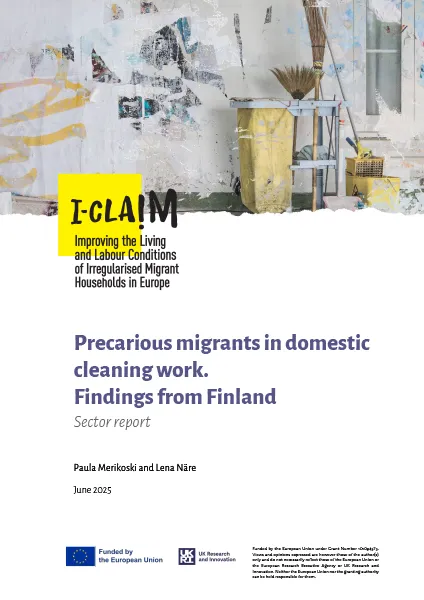Precarious migrants in domestic cleaning work. Findings from Finland
Paula Merikoski, Lena Näre
How to cite:
Merikoski, P., and Näre, L. (2025) Precarious migrants in domestic cleaning work. Findings from Finland. I-CLAIM. DOI: https://zenodo.org/records/15775520
Precarious migrants in domestic cleaning work. Findings from Finland
Paula Merikoski, Lena Näre
This report discusses the experiences of migrant workers in Finland’s domestic work sector, focusing on how precarious migration status affects working conditions and everyday life. The study, part of the I-CLAIM research project, draws on interviews with workers and stakeholders to explore the interplay between migration status, everyday life and employment.
Finnish labour legislation does not include a specific domestic work category; rather, domestic work encompasses various tasks, from household cleaning to assisting people with disabilities at home. The organisation of work in the sector is influenced by cultural values and welfare, gender and migration regimes. The demand for outsourced domestic work and cleaning services has grown in recent decades, despite Finland’s extensive welfare state providing childcare and elderly care, and the share of migrant workers in the sector is increasing. Cleaning is the most common job for migrants, and 32% of all cleaners are foreigners. While most migrant workers hold regular residence status and formal employment contracts, informal employment persists in domestic cleaning, especially occasional cash-for-cleaning jobs, and among migrants with precarious legal status. As a labour shortage sector, cleaning and domestic work was long exempt from labour market testing in all regions of the country and continues to be in most regions. This means that it is possible for a non-EU worker to regularise their residence through employment in this sector. However, legislation introduced in autumn 2024 restricts asylum seekers with negative decisions from applying for work-based residence permits, thereby creating barriers to regularisation through work.
Migrant workers find employment in this sector through different channels. Often, they work through agencies, through direct employment with employer-households, or are hired by a municipality. A special arrangement is the so-called ‘cleaning circle’, whereby multiple households collectively hire a cleaner, thus providing a potential route for regularisation.
We interviewed 20 workers and 12 stakeholders. The participants included migrants from diverse backgrounds and were primarily women. The interviews revealed that precarious residence status leads to vulnerability and even exploitation, with informal side work being common. Migrant workers face multiple challenges, including dependency on employers and health risks. The entanglement of residence permits and labour markets creates vulnerabilities, with temporary permits affecting life plans and increasing susceptibility to abuse.
This study highlights the precariousness of migrant workers in Finland’s domestic work sector—a precariousness exacerbated by restrictive migration policies. While for many domestic and cleaning work offers a potential route to a regular residence in Finland, broader policy changes are needed to protect workers, reduce their dependency on employers, and provide access to more stable residence permit types.
